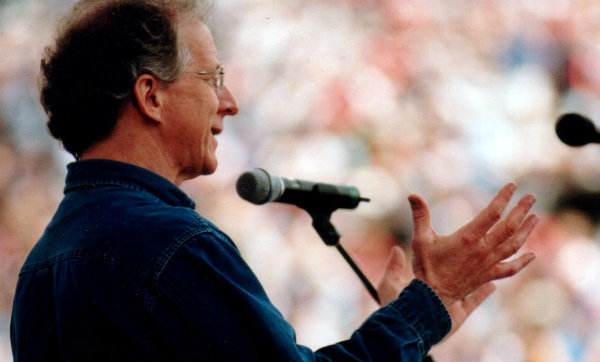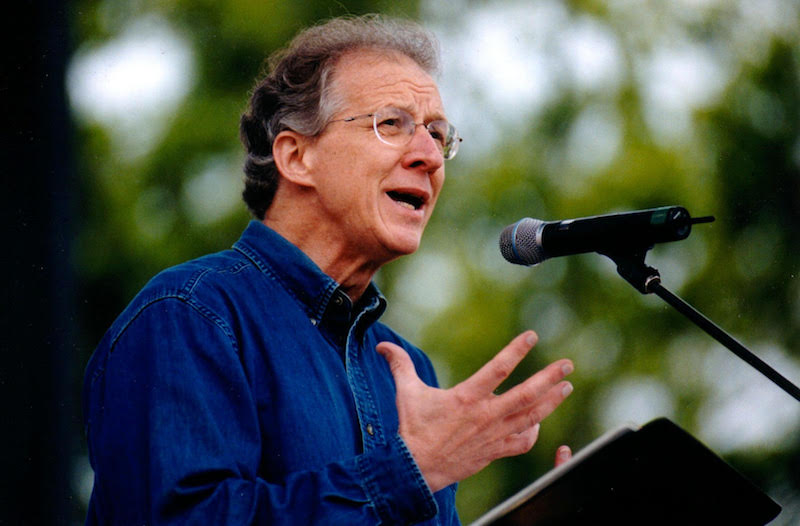The morning of May 20, 2000, dawned damp and grey over a grassy field in Memphis, where a portable city had sprung up overnight. Thousands of muted tents stood in wet rows; fog made everything hazy.
About 40,000 college students had arrived for the fourth Passion Conference, its first outdoors. It was a day they wouldn’t forget, one they describe with words like “special” and “holy” and “weight of glory.”
Even people who weren’t there remember it, because that day author and pastor John Piper gave his famous “seashells” message.
“What an epic message it was!” said Desiring God executive editor David Mathis. “When we trace the history of Desiring God and John Piper’s rise in influence over the years, One Day 2000 may be the single most significant event in terms of exposing a wider audience to Piper.”
Before he spoke, Piper asked God for “a prophetic word that would have a ripple effect to the ends of the earth and to eternity.”
He got it. The message exploded out, sparking a book, a study guide, tracts, and even a rap song.
‘One Day 2000 may be the single most significant event in terms of exposing a wider audience to Piper.’
“The sermon was formative for our generation,” said 35-year-old Matt Capps, now a senior pastor in North Carolina. “Only time will tell if it marks Christian history the way sermons like [Jonathan Edwards’s] ‘Sinners in the Hands of an Angry God’ did. But in our generation, at least in my circles, if you mention the seashells illustration, everybody knows what you’re talking about.”
The Problems
Piper spoke in the early afternoon, around 1 p.m. The temperature hung mostly in the 60s all day, briefly reaching a high of 72 degrees. Students sat on jackets or garbage bags on the wet grass, fanned out around a wooden stage.
“It was the biggest group I’d ever spoken to in my life,” Piper remembers. The size of the crowd made him anxious. “When I was in high school, I couldn’t speak in front of groups. I was paralyzed with fear. It was a strange thing. My mother took me to the psychologist. . . . So every time I stand before a new large audience, I always have a lot of memories I have to overcome.”
The crowd’s size was just the beginning of Piper’s troubles. They were also restless. With no bathroom or food breaks scheduled—funneling 40,000 people through porta-potties and food tents at the same time would be a logistical nightmare—students were up and down all day, getting snacks or using the bathroom or stretching their legs.
“It was like a stadium full of football watchers who keep going to get hot dogs,” Piper said.

But worst of all was the wind.
“Nine minutes in, half of my notes blew away,” Piper said. Thankfully, it was the left-hand half, which he was finished with. “I don’t know what I would have done if the right-hand notes had blown away.”
For the next 27 minutes, he held down his remaining notes with one hand, making all of his gestures with his right arm. Piper, who moves both arms almost constantly when he talks, felt like he “had been split in half.”
“The atmosphere itself was almost entirely problematic,” Piper remembers. “The fact that anybody got any help out of that message is evidence of sovereign grace.”
The Seashells
Standing on stage in front of the perpetually moving crowd, with a damp wind in his face, Piper prayed.
“Father in heaven, you know how inadequate I feel at this moment,” he said aloud. “And so I ask for a very special anointing and help from you.” Eyes squeezed shut, he took a deep breath and asked for grace.
Another big breath, and he began: “You don’t have to know a lot of things for your life to make a lasting difference in the world.”
You don’t have to be smart, or good-looking, or from a good family, he told them. “You just have to know a few, basic, glorious, majestic, obvious, unchanging, eternal things, and be gripped by them, and be willing to lay down your life for them.”
Five minutes in, he laid out the comparison nobody forgot:
Three weeks ago, we got news at our church that Ruby Eliason and Laura Edwards were killed in Cameroon. Ruby Eliason—over 80, single all her life, a nurse. Poured her life out for one thing: to make Jesus Christ known among the sick and the poor in the hardest and most unreached places.
Laura Edwards, a medical doctor in the Twin Cities, and in her retirement, partnering up with Ruby. [She was] also pushing 80, and going from village to village in Cameroon. The brakes give way, over a cliff they go, and they’re dead instantly. And I asked my people, “Is this a tragedy?”
Two women, in their 80s almost, a whole life devoted to one idea—Jesus Christ magnified among the poor and the sick in the hardest places. And 20 years after most of their American counterparts had begun to throw their lives away on trivialities in Florida and New Mexico, [they] fly into eternity with a death in moment. “Is this a tragedy?” I asked.
The crowd knew the answer, calling out, “No!”
“It is not a tragedy,” Piper affirmed. “I’ll read you what a tragedy is.”
He pulled out a page from Reader’s Digest.
(“I don’t know where I got it, because I didn’t subscribe,” Piper remembers now. “I must have found it in a doctor’s office somewhere.”)
He read it to them:
‘Bob and Penny . . . took early retirement from their jobs in the Northeast five years ago when he was 59 and she was 51. Now they live in Punta Gorda, Florida, where they cruise on their 30-foot trawler, play softball, and collect shells.’
“That’s a tragedy,” he told the crowd.
And there are people in this country that are spending billions of dollars to get you to buy it. And I get 40 minutes to plead with you—don’t buy it. With all my heart I plead with you—don’t buy that dream. . . . As the last chapter before you stand before the Creator of the universe to give an account with what you did: “Here it is, Lord—my shell collection. And I’ve got a good swing. And look at my boat.”
“Don’t waste your life,” he said, the words quietly tucked in before he barreled into another memorable anecdote, this one about a plaque in his home featuring C. T. Studd’s poem, “Only one life, twill soon be past / Only what’s done for Christ will last.”
The way to not waste your life, Piper said, is to give God glory for every gift, because every one—from a new car to physical safety to your own next heartbeat—is grace bought and paid for through the cross.
Piper liked that point enough to title his message “Boasting Only in the Cross.”
But “don’t waste your life” also caught at the crux of Piper’s message, and became the title of everything—his book, Lecrae’s rap tribute, future messages—that grew out of that day.
The Students
“I remember I was 54, and had four sons from 17 to 27, and for the first time, I was feeling fatherly toward this crowd,” Piper said. His continued participation at Passion conferences is “a riddle of history,” he said. “The older I get, the weirder it sounds.”
It looked weird, too, at least to Justin Converse, who was 24 then.
“I remember thinking, Who is this old guy coming up on stage?” said Converse, who now listens to Piper’s daily podcast, has desiringGod.org bookmarked in his browser, and owns every Piper title.
“His hair was crazy in the wind, and he looked like a dad,” remembers Paul Coleman, then 19.
Then Piper started to talk.
“It changed my perspective about not just retirement, but what I’d do with my career,” Converse said. He would go on to work a few years in advertising for clients like Hilton Hotels before joining Dennis Rainey’s FamilyLife ministry, then Nancy Leigh DeMoss’s Revive Our Hearts radio program.
“I’m probably never going to ‘retire,’” he said. “I want to do something with my life beyond 50, 60, 70 that makes a difference, whether that’s volunteering at a soup kitchen or mentoring kids or whatever that looks like.”
TGC Council member Matt Carter of The Austin Stone Community Church feels the same way. “I was in the crowd. That sermon ended all my dreams of retirement,” he tweeted.
Coleman called the message “a crucial building block that helped me see it was worth it to live for Jesus.” Today he’s a pastor in South Carolina, working with high school and college kids.
Chad Huddleston had just finished his freshman year of college, and was sitting in the middle of the crowd.
“That was probably one of the most impactful sermons of my life,” he said. Several years later, Huddleston and his wife left to do mission work in China.

Marian Jordan Ellis was sitting in the back, a 27-year-old volunteer and a new Christian. The poem Piper quoted “literally rang in my ears for 15 years,” she said. She spent the next two weeks on a trip to Israel with Passion conference founder Louie Giglio.
“It was like a fork in the road,” she says of the conference and trip. “Either you’re going to live for the glory of God or for yourself. And I had already been living for myself, so I knew I had to go the other direction. Because who wants to waste their life, right?”
She began teaching the Bible to her Christian high school students, then headed back to seminary before starting Redeemed Girl Ministries. Now she teaches the Bible to young women all across the country.
But those weren’t the only ways Piper’s message rushed out from Memphis.
The Ripples
Piper asked for ripples; God gave him breakers.
“The growth of John’s ministry and influence was pretty slow, steady, and organic throughout the ’90s, until One Day gave it a boost like nothing else,” Mathis said. “The Millennial wave was just beginning to crash into adulthood. . . . Speaking to 40,000 largely Southern collegians exposed him to a massive audience who likely had never heard of him before, and were just at the right formative stage of life to rally to the Don’t Waste Your Life summons.”
Crossway asked him for a book, and Don’t Waste Your Life was published in 2003. To date, the book has sold more than 600,000 copies.
“It's significant when a book sells over 100,000 copies in its first nine months—and then 300,000 in its first three years total,” said Crossway executive vice president Justin Taylor. “But as significant to me is that it sold more than 30,000 copies in 2016, which is 13 years later. That means every single day of last year, 80 people bought a copy. A lot of books are like firecrackers: an impressive explosion at the beginning, then they drift away. Piper's book has had staying power.”
“There were a lot of people showing up at seminary in those days who had been impacted by the Passion ministry and Piper’s preaching and the book,” said Denny Burk, a Southern Baptist Theological Seminary professor who was there that day, wearing a rain slicker. “That was the main legacy I remember from One Day.”
Not only were they reading the book, they were watching the movie. Ben Peays, executive director of The Gospel Coalition, first heard the sermon while sitting at his desk at the financial services company where he worked.
“I was two years into the American workforce and trying to suppress a part of me that wondered, Is this what life is about?” Peays said. “Piper’s words were a powerful wakeup call for my generation. That sermon gave us permission to question the cultural current that was sweeping along so many Americans.”
Peays played the video for his roommates and his dad. Then he quit his job, broke off his engagement, and headed to Eastern Europe to plant churches before enrolling in seminary.
“It was empowering and freeing to feel like somebody else was talking to my heart,” he said. “It reached out and grabbed me and turned my face toward the idea of a big God and doing things differently.”
“The first time I listened to it, I didn’t know how to process it,” said Matt Capps, who still shares the audio and video files with people. “I had never heard anyone draw a line in the sand like that. . . . It changed how I spent my time, what I invested in, the overall trajectory of my life.”
He started to study theology, developed a passion for teaching, and went to seminary. Now, in his church office, a glass bowl of seashells sits on his bookshelf.
“Don’t tell Piper,” he says with a laugh, although the shells remind him of living for God instead of for retirement.
He’s not the only one to chuckle—the shells have become so familiar that they’re a cultural memory for the “young, restless, Reformed,” popping up in inside jokes online and in person: “You’re going to the beach? Don’t pick up any shells!”
More Ripples
The sermon affected not just college students, but also their parents.
“I’ve had probably more 50-somethings thank me for that book than young people,” Piper said. “The couple that went to Punta Gorda were 59 and 51—that’s what stung. These were people in their prime deciding to play for the rest of their lives. . . . I think I have had as many 50-somethings [as young people] thank me for rescuing them from the folly of retirement.”
I think I have had as many 50-somethings [as young people] thank me for rescuing them from the folly of retirement.
(For the record, Piper’s not against “an 85-year-old who can’t see or walk” slowing down. But he does take issue with the “62-year-old who has a good 20 years of health left and is going to play golf? Good grief.”)
The sermon has also rippled down to the children of those college students.
Zack Curry, who sat on the grass next to Converse, now takes his three elementary-age daughters on mission trips every year to an orphanage in Tijuana. Last year, Converse joined them with his 15-year-old daughter Anna.
“I wanted to shape her thinking by taking her somewhere she sees extreme poverty,” Converse said. “Nothing would thrill my heart more than for her to fall in love with people of Mexico.” (Anna wants to go back next year; she also wants to major in Spanish.)
Chad Huddleston is now back from China, teaching and coaching at a public school in Texas. But he wants his kids to experience the mission field, too.
“When the Lord asks, our ‘yes’ is already on the table,” he said.
“Whether you’re an engineer or a doctor or teacher or overseas missionary or a garbage collector—whatever it may be, what I took from Piper is that the real tragedy would be coming to the end of your life, and all you have are the things you’ve accomplished for yourself,” he said. “It does not matter what you do if you’re doing it for his glory.”
Related:
Download your free Christmas playlist by TGC editor Brett McCracken!
 It’s that time of year, when the world falls in love—with Christmas music! If you’re ready to immerse yourself in the sounds of the season, we’ve got a brand-new playlist for you. The Gospel Coalition’s free 2025 Christmas playlist is full of joyful, festive, and nostalgic songs to help you celebrate the sweetness of this sacred season.
It’s that time of year, when the world falls in love—with Christmas music! If you’re ready to immerse yourself in the sounds of the season, we’ve got a brand-new playlist for you. The Gospel Coalition’s free 2025 Christmas playlist is full of joyful, festive, and nostalgic songs to help you celebrate the sweetness of this sacred season.
The 75 songs on this playlist are all recordings from at least 20 years ago—most of them from further back in the 1950s and 1960s. Each song has been thoughtfully selected by TGC Arts & Culture Editor Brett McCracken to cultivate a fun but meaningful mix of vintage Christmas vibes.
To start listening to this free resource, simply click below to receive your link to the private playlist on Spotify or Apple Music.


































